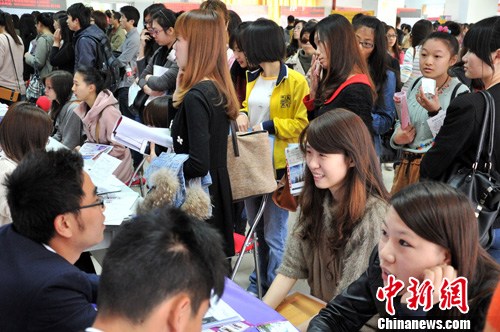 The photo taken on Mar 5 in Fuzhou, Fujian Province, shows women are looking for opportunities at a job fair. The second-child policy may make it harder for married women to find a job.[Photo/chinanews.com] |
China has loosened its family planning policy by allowing couples to have a second child if either parent is an only child. Unfortunately, the policy has resulted in discrimination against some married women who are looking for jobs or are already employed, according to the Xinhua News agency.
Xia Fang, a Changsha local who gave birth to her first child 10 months ago, said that during job interviews she is always asked if she is an only child or if she plans to have a second child.
"I don't plan to have a second child. But when potential employers learn that my first child is a girl, they think I'm likely to have another baby," said Xia.
Before the second-child policy was introduced, married women with children and work experience had an advantage in the job market, but now they are being confronted with gender discrimination again, Xia added.
Female employees of child-bearing age are being affected, as well. A white collar worker surnamed Liu said she was passed over for a promotion that went to a young man, because her boss thought she might plan to have a second child.
"Women have to work harder to be given equal status in the workplace. And many face pressure from their families to have second children, which can affect their career prospects," Liu said.
"Companies can predict the cost of a female employee's maternity leave when they're allowed to give birth to only one child," said Li Bin, a professor of sociology at Zhongnan University. "But some middle and small-sized companies can't bear the costs of two leaves in a few years."
Ms. Wang, an HR manager at a company, said the second-child policy revealed the disadvantages of female employees in the workplace, while giving male workers more advantage. "With two children, men suffer more life pressure, but that will motivate them to work harder."
"Giving birth to children is a social responsibility that should not be shouldered by women alone," said Li Bin.
China has yet to release specific laws on gender discrimination in the workplace.
